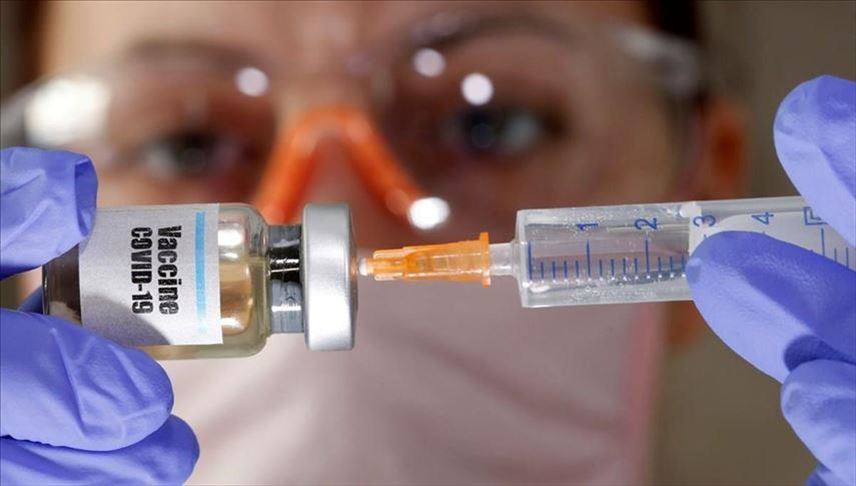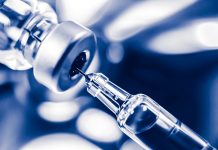
The first large-scale American trial to test a potential COVID-19 vaccine began about 6:45 Monday morning in Savannah, Georgia when the first participant received a shot in the arm.
To test for safety and effectiveness, 15,000 people will get two shots of the candidate vaccine a month apart. Another 15,000 will receive placebo on the same schedule.
The first trial is a collaboration between the National Institutes of Health and a biotechnology company called Moderna, based in Cambridge, Massachusetts.
Pharmaceutical giant Pfizer, partnering with German vaccine developer BioNTech, announced late Monday that it had also launched an equally-sized late-stage trial of its candidate vaccine, which is based on similar technology. Several other trials of different candidate vaccines are expected to begin in the next two to three months.
The trials are being supported by more than $6 billion in public spending intended to speed vaccine development by manufacturing hundreds of millions of doses before clinical trials determine whether each candidate is safe and effective. The at-risk manufacturing approach has never been tried before. If a candidate vaccine fails this so-called Phase 3 testing, the doses will be thrown out, federal officials have said.
In a telephone briefing Monday to herald the start of the first Phase 3 trial, several people leading the effort described it as a milestone in the development of a vaccine against SARS-CoV-2, the virus that causes COVID-19.
“This is a truly historic event in the history of vaccinology,” said Dr. Anthony Fauci, who is leading the government’s vaccine development as the head of the National Institute of Allergy and Infectious Diseases.
‘No compromise’ on vaccine safety
Fauci and NIH Director Dr Francis Collins emphasized that although vaccine development is moving at unprecedented speed, this large Phase 3 trials will ensure that a vaccine is safe and effective.
“There is no compromise at all with regard to safety nor scientific integrity,” Fauci said.
Officials will use each trial to see if a candidate vaccine is at least 60% effective against scars-CoV-2. About 150 to 160 people must become infected in each trial in order to prove a candidate vaccine is effective.
Fauci said results from the trials aren’t likely before November or December, but he did leave open the possibility of stopping a trial early if results quickly show a vaccine is effective.
One concern — that there would not be enough infections in the United States to prove effectiveness — is unfortunately not likely to be a problem, Fauci said.
“We do believe we have enough activity in our own country to be able to get the answer from the sites in our own country,” he said. Sites in other nations, including Brazil and South Africa, could be used if the infection rate is too low here.
The U.S. government is pushing to get a diverse group of trial volunteers, Collins said, particularly from groups that have been hard-hit by the virus: African Americans, Latinos, Native Americans, older adults and people with chronic illnesses.
More than 150,000 people have expressed willingness to volunteer for the clinical trials, but not all of them will qualify or will be part of target groups. To volunteer, go to coronaviruspreventionnetwork.org.
Only people who are not currently infected will be eligible for the trials. Viral testing will be part of the sign-up protocol, Fauci said.
The speed of the trials will be determined by how quickly people sign up, Fauci said, though he hopes they will all be fully enrolled by the end of the summer. “The sites are open and they’re ready to go,” Fauci said, specifically citing those in Florida and other COVID-19 hot spots.
“Hopefully, there will be a lot of people who will be vaccinated today and over the next couple of months.”
All of the coronavirus vaccines in development use new technologies that have never been approved for a vaccine. None is grown in eggs, as many current vaccines are,so egg allergies won’t be a problem. None contains the whole, live virus — many vaccines use a weakened form of a virus — so they cannot transmit SARS-CoV-2.
Three other possible vaccines soon to enter large-scale testing
The other three companies slated to soon enter Phase 3 trials with federal funding are: Novavax of Maryland, Johnson & Johnson of New Jersey, and AstraZeneca, whose American headquarters is in New Jersey. AstraZeneca is working with a vaccine developed at Oxford University in the United Kingdom.
Pfizer has said it will accept $2 billion in federal funding only if its vaccine is approved and it delivers 100 million doses. The federal government could buy 500 million more.
In a news release issued Monday afternoon, Pfizer and BioNTech said they had launched a Phase 2/3 study, which would include 30,000 participants from 120 locations, including 39 states, Argentina, Brazil, and Germany.
If the trial is successful, the companies said they will seek regulatory review as soon as October. Up to 100 million doses will be available by the end of the year, and approximately 1.3 billion doses by the end of 2021, according to the companies.
Early trial results of the Moderna and AstraZeneca vaccines were published in recent weeks. Pfizer has also released early results. All three were shown to be safe and triggered an immune response that could mean they would be effective, although that can only be shown with a Phase 3 trial.
Moderna CEO Stéphane Bancel promised during Monday’s conference call that his company would be able to produce 500 million doses of its candidate vaccine in this fiscal year, and potentially another 1 billion doses next year.
The federal funding guarantees that most of these doses will first go to Americans, though some vaccine developers are also manufacturing doses for others around the world.
All the vaccine candidates in or close to Phase 3 trials will likely require two doses a month apart, although the trials should be able to confirm that, Fauci said.
Scientists have estimated that at least 60-70% of the roughly 328 million people in the U.S. would need to be protected either through natural infections or vaccines to stop the widespread transmission of the coronavirus.
Since not everyone will be able to get a vaccine the day a candidate is approved, the government, with help from the independent National Academies, will decide who will get priority, Collins said.
Trial participants will be monitored for a year to check for vaccine safety
Moderna’s Bancel said he expects his company’s vaccine will be shown to be safe during the Phase 3 trial. In an earlier trial, most people who received the same dose had typical vaccine side effects, including fever and sore arms.
The vaccine does not get into a cell’s nucleus, Bancel said, so the chance of it integrating with human DNA is very low. It has a half-life of only six to 10 hours, so it does not hang around long in the body.
“We have the belief that there is a very low chance of long-term safety (problems),” he said, though all trial participants will be followed for a year to make sure they don’t have reactions later. The FDA can add longer-term safety requirements as part of the approval process.
Vaccine trial participants are typically followed for two years, Fauci said, to determine if their protection continues that long. Because SARS-CoV-2 is a newly discovered virus, no one knows how long people are protected after being vaccinated or infected.
Overall, Collins said, the trials are “a big American opportunity for people to come on board as our partners, to try to take part in what has been a historic effort to bring to an end the worst pandemic our world has seen in over 100 years.”











